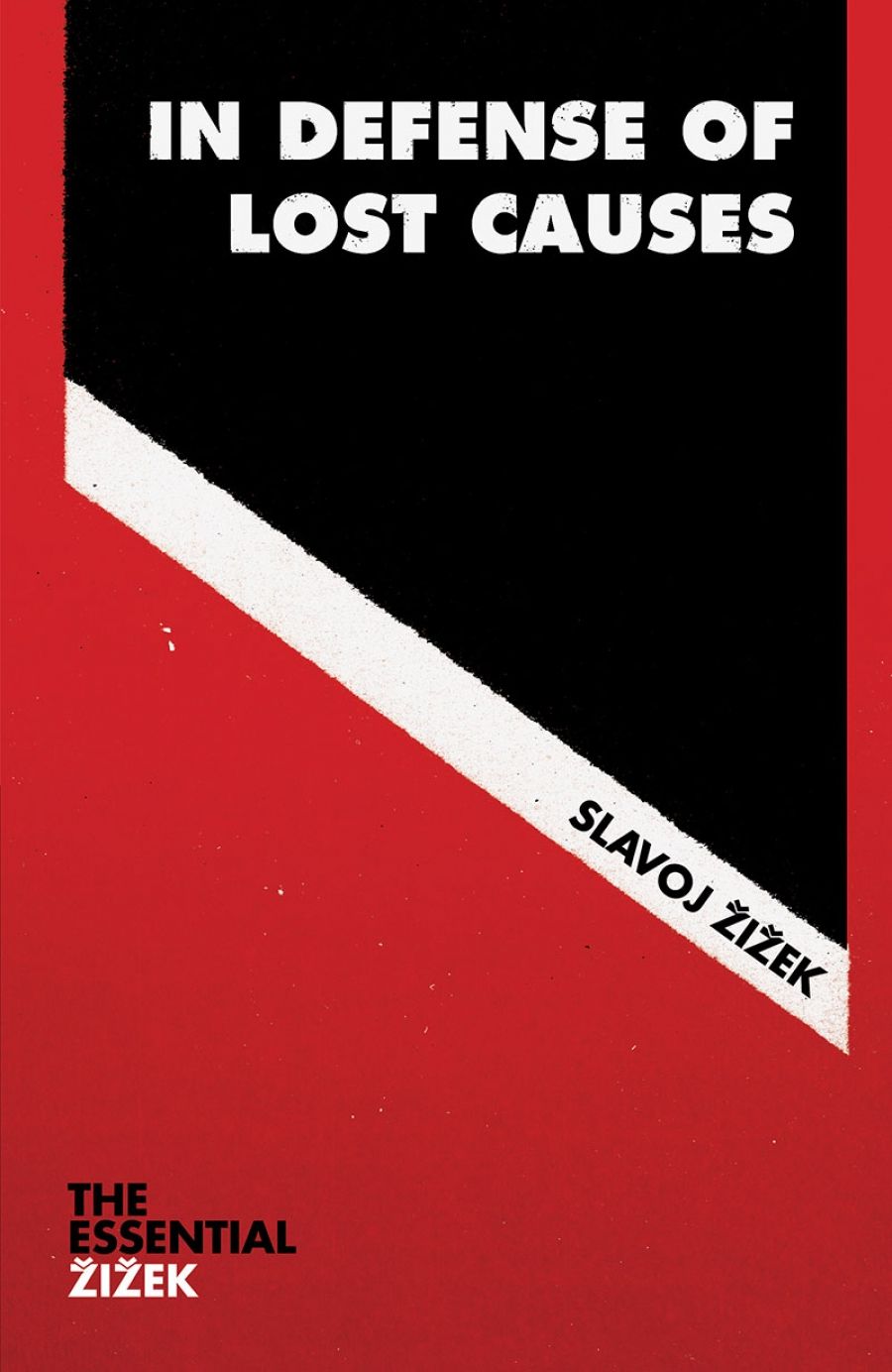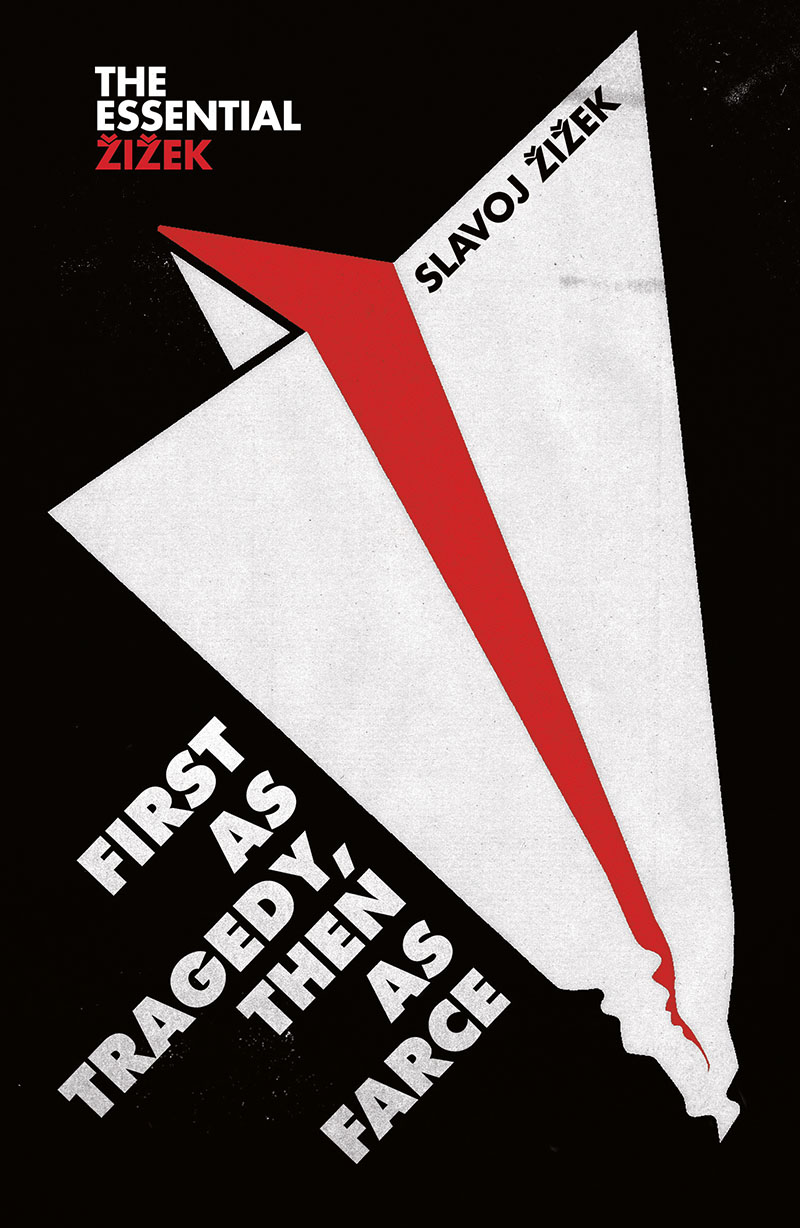
- Free Article: No
- Contents Category: Philosophy
- Review Article: Yes
- Article Title: The day after capitalism
- Article Subtitle: Two new works by Slavoj Žižek
- Online Only: No
- Custom Highlight Text:
In the chapter ‘Revolutionary Terror’ in In Defense of Lost Causes (2008), world-renowned Lacanian theorist Slavoj Žižek briefly discusses Georgi M. Derluguian’s Bourdieu’s Secret Admirer in the Caucasus (2005). Derluguian’s book traces the extraordinary career of one Musa Shanib, from Abkhazia on the Black Sea, who moved from being a Soviet dissident to a democratic political reformer and, finally, a Muslim fundamentalist, all the while maintaining an unwavering intellectual loyalty to the great French sociologist Pierre Bourdieu.
- Book 1 Title: In Defense of Lost Causes
- Book 1 Biblio: Verso, $39.95 pb, 530 pp
- Book 2 Title: First as Tragedy, Then as Farce
- Book 2 Biblio: Verso, $26 pb, 157 pp
- Book 2 Cover Small (400 x 600):

Žižek’s In Defense of Lost Causes, a huge, unwieldy monster of a book, covers such topics as America’s use of torture during the ‘war on terror’, a paradoxical defence of Martin Heidegger’s brief alliance with Nazism in the early 1930s, a reading of a whole series of Hollywood and non-Hollywood films (Schindler’s List, 300, The Lives of Others) for their hidden familial ideology, and a critique of Islamic terrorism for not being ‘violent’ enough. Whatever else one might think of the individual analyses and arguments, one cannot help but be struck by the sheer intellectual energy that marks them, and by the almost superhuman task of reading and synthesis that allows Žižek to produce one of these 500-page behemoths a year. Virtually every page of the book crackles with an overturning of political common sense, a statement of the forbidden in the timid neoliberal consensus that currently passes for politics. ‘The true problem with Nazism is not that it “went too far”, but that it did not go far enough,’ Žižek writes, and appears to believe it. ‘We suggest that [what is at stake] is the risky but necessary gesture of having the courage to elaborate a positive liveable project “beyond democracy”,’ he elsewhere writes, and seemingly wants us to follow him.
It would be a mistake, however, for all of this craziness – or, to use one of his favourite words, tastelessness – to think that Žižek does all of this merely to shock or provoke. Indeed, in the chapter ‘Radical Intellectuals’, Žižek criticises Wendy Brown’s notion of the philosopher as a kind of ‘gadfly’, in a tradition that would go all the way back to Socrates. On the contrary, Žižek means what he says. His works comes out of an engaged political struggle; and one of the signs of his sincerity is the fact that, for long-time readers of his work, so much here is inconsistent with his previous positions; is part of an ongoing argument with none other than himself. Most obviously, his work is explicitly arguing for Marxism when he first came to prominence with such books as The Sublime Object of Ideology (1989), which advocated a form of ‘democracy’. Inspired by the work of Badiou, Žižek puts forward a series of political prescriptives (egalitarianism, justice, terror, trust in the people), whereas, elsewhere, he has argued that the aim of philosophy is not to provide solutions. Finally, on the level of individual cultural judgements, Žižek positively re-evaluates the films of Leni Riefenstahl, whereas previously he had mocked her for living so long.
The recent First as Tragedy, Then as Farce (2009) is an even more direct and polemical manifesto for what it calls ‘new forms of communist praxis’. Much of the text was written for Žižek’s concluding address at the 2009 conference he organised for Birkbeck College, London, called On the Idea of Communism (interested readers can find clips on YouTube of Žižek delivering it). Hair sweaty and matted, eyes blazing, gesticulating wildly, and enunciating in his thick accent, the urgency – even demagoguery – of Žižek’s stance is evident. Explicitly situated in the aftermath of last year’s global economic crisis – and, such is Žižek’s speed of production, taking into account even last year’s recovery – the book is an unrelenting critique of capitalism and, more specifically, of the idea that the crisis was merely an aberration, something that, with the reform of the banking industry, can be avoided in the future. (This is the implicit assumption of Kevin Rudd when he lambastes ‘extreme capitalism’ and ‘excessive greed’.) As opposed to this, Žižek makes the point that it is capitalism itself that is to blame and cannot be reformed. ‘Wild speculation’ and ‘excessive greed’ are intrinsically part of the capitalist process, without which it would not work at all. Capitalism is made possible by the crises that will eventually lead to its end. As Žižek puts it in the second of the two long chapters that make up the book, ‘The Communist Hypothesis’: ‘The paradox of capital is that you cannot throw out the dirty water of financial speculation while keeping the healthy baby of real economy.’
Žižek’s demand for a return to the ‘eternal idea’ of communism can seem strange coming from someone so recently ‘liberated’ from the rule of Tito’s Yugoslavia. Surely communism, like Nazism, is one of those great totalitarian disasters by which the twentieth century is marked? Žižek admits as much, frankly confessing the historical failure of Stalinism and the unmitigated disaster of agricultural collectivism under both Lenin and Mao. Isn’t something like communism impossible now that we have attained with Francis Fukuyama something like a post-political ‘end of history’? Again, here too Žižek admits the ‘utopian’ nature of what he is proposing. But, as he equally puts it, perhaps the real ‘utopians’ are those who think that things can continue the same, that environmental degradation will not kill us, that the world will not run out of resources.
Today, in Australia, a public intellectual like Clive Hamilton is shouted down when he suggests that it is possible democracy might have to be suspended in order to enact meaningful climate change legislation. Rudd, for all of his purported admiration of the moral courage of the anti-Nazi theologian Dietrich Bonhoeffer, would never have the courage to challenge the idea that economic growth can continue forever. In this context, the political program of Žižek can appear impossible or, rather, unthinkable. But it will appear less so in the years to come. Indeed, it will appear necessary, a final salvation. Žižek, despite the vagueness and even self-contradiction of the proposals in both of these books, is simply doing what we have always demanded of our philosophers: he is thinking. But to think today, truly to think, is to think the impossible, to think what things will be like the ‘day after’ capitalism.


Comments powered by CComment